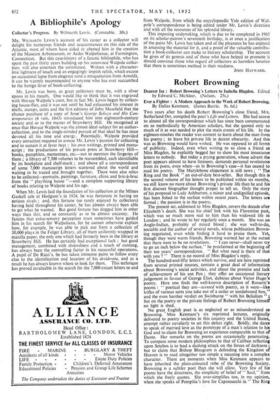A Bibliophile's Apology
Collector's Progress. By Wilmarth Lewis. (Constable. 30s.) MR. WILMARTH LEWIS'S account of his career as a collector will delight his numerous friends and acquaintances on this side of the Atlantic, most of whom have aided or abetted him in the creation of the Museum Arbuteanum, or Aedes Walpolianae, at Farmington, Connecticut. But this case-history of a fanatic bibliophile, who has spent the past thirty years building up his renowned Walpole collec- tion, will also entertain the uninitiated. Written with a character- istic lightness of touch and an engagingly impish relish, which excuse an occasional lapse from elegance (and a misquotation from Arnold), it can be warmly recommended to anyone who has ever succumbed to the benign fever of book-collecting.
Mr. Lewis was born, as great collectors must be, with a silver spoon in his mouth. One would like to think that it was engraved with Horace Walpole 's crest, but in fact Mr. Lewis began by collect- ing house-flies, and it was not until he had exhausted his interest in shells, stamps, coins and the first editions of John Masefield that the chance purchase of a copy of Jesse's George Selwyn and His Con- temporaries (4 vols. 1843) introduced him into eighteenth-century society and so to the master of Strawberry Hill. He recognised at once that Horace Walpole was the almost ideal subject for an author- collection, and to the single-minded pursuit. of that ideal he has since devoted all his time and energy. Potentially, Walpole provided every attraction required to arouse Mr. Lewis's passion for collecting and to sustain it at fever heat : his own writings, printed and manu- script; the productions of his private press at Strawberry Hill— books, pamphlets, mementoes, etc.—not to mention the forgeries of them ; a library of 7,500 volumes to be reassembled, each identifiable by its bookplate and shelf-mark ; and above all a correspondence of some 7,000 manuscript letters scattered about the world and Waiting to be traced and brought together. There were also relics to be collected—portraits, paintings, furniture, china and bric-i-brac from the "plaything house "—and a complete supporting library of books relating to Walpole and his age.
When Mr. Lewis laid the foundation of his collection at the Milnes Gaskell sale at Hodgson's in 1924, he was fortunate in having no serious rivals • and, this fortune (so rarely enjoyed by collectors) having held throughout his career, he has almost always been able to get what he wanted. But good fortune has dogged him in other ways than this, and so constantly as to be almost uncanny. He fancies that extra-sensory perception must sometimes have guided him in his search for Walpoliana, for he cannot otherwise explain how, for example, he was able to pick out from a collection of 30,000 plays in the Folger Library, all of them uniformly wrapped in manilla paper, the only one which had formerly been in the library at Strawberry Hill. He has certainly had exceptional luck ; but good management, combined with shrewdness and a touch of cunning, has always been the controlling factor in his successful operations. A pupil of De Ricci 's, he has taken immense pains to follow every clue to the identification and location of his desiderata, and as a result he has always known where to look for them. This technique has proved invaluable in the search for the 7,000 extant letters to and from Walpole, from which the encyclopaedic Yale edition of Wal- pole's correspondence is being edited under Mr. Lewis's direction and with all the resources of his splendid library.
This imposing undertaking, which is due to be completed in 1965 on its scholar-patron's seventieth birthday, is at once a justification of the pains Mr. Lewis has taken and of the pleasures he has enjoyed in amassing the material for it, and a proof of the valuable contribu- tion a book-collector can make to literary scholarship. The account he gives of its genesis and of those who have helped to promote it should convince those who regard all collectors as harmless lunatics that there is sometimes method in their madness.
JOHN HAYWARD.


































 Previous page
Previous page